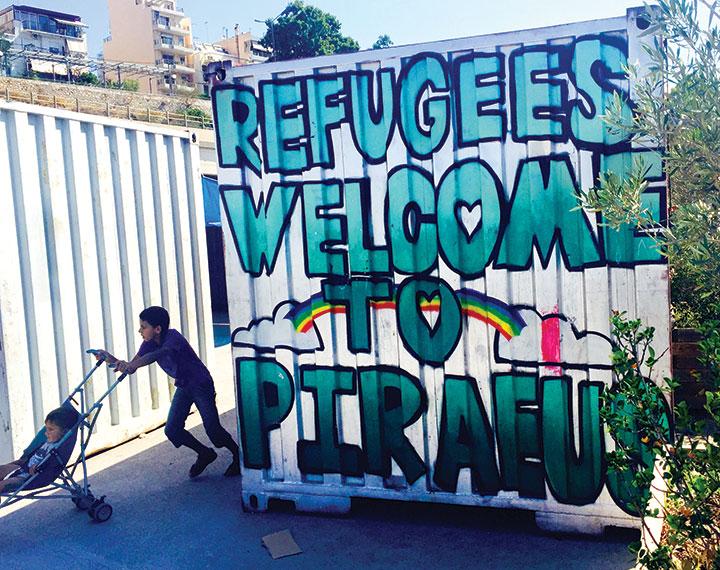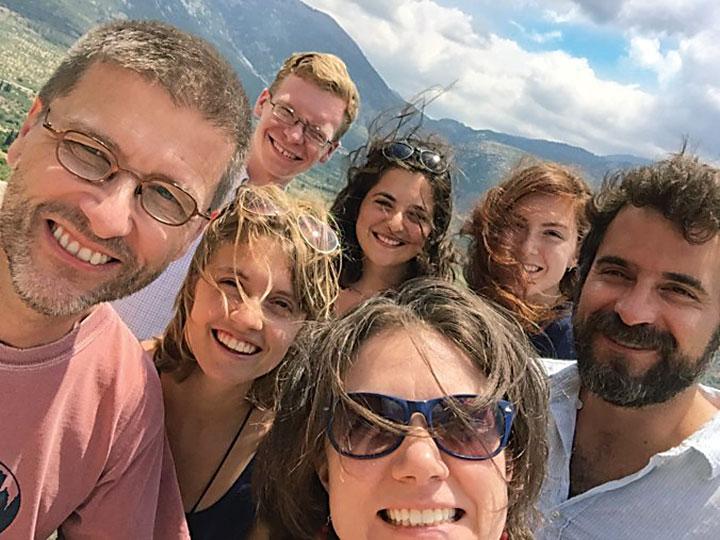
This summer, six undergraduates took part in Princeton’s first international journalism seminar, a five-week course based in Athens that focused on Greece’s migrant and economic crises. Hayley Roth ’17, one of the students, reports on the class.
It was a sweaty July morning in the Ritsona refugee camp north of Athens, and an English class was starting in an open-air tent. A young woman pointed to some simple phrases scrawled on a blackboard. “What do you wish for?” she asked as the 10 adults in the class fanned themselves with sheets of paper.
A man at least 15 years her senior raised his hand. “I wish for peace,” he said haltingly. “Good!” The woman nodded encouragingly. “What do you want?” “I want to go to Germany.”
“What do you like?” she asked. “I like English,” he replied. “And what do you hate?” “I hate ISIS.”
Ritsona, a former air force radar station that now houses about 600 Middle Easterners fleeing violence and persecution, was among the refugee camps in Greece visited by six Princeton students who tested the waters of foreign correspondence in a summer course called “Reporting on the Front Lines of History.”
The course was led by Joe Stephens, Ferris professor of journalism and an investigative projects reporter for The Washington Post. “Our journalists came away with a deeper understanding of the roots and impact of the migration crisis, which will be one of the defining events of their time,” Stephens said.
Mirroring what foreign correspondents must deal with, the course was designed “to be fluid, able to pivot in an instant to react to events,” he explained. “We ripped up the game plan more than once as the refugee situation evolved.” For example, initial plans to visit the Turkish coast to retrace the refugees’ migration routes were dropped following the violence in Istanbul and the unrest of the failed Turkish coup in July.

James Haynes ’18 said he was struck by the special challenges of foreign correspondence. “You can’t fully grasp how or to what degree the language barrier, access to documents, and cultural norms of a foreign country will impact your reporting until you get there,” he said.
The students spent four weeks in Athens — where stadiums used in the 2004 Olympics are now filled with refugee families — and one week in Lesbos, a Greek island 5 miles off the coast of Turkey that has been transformed into a mosaic of refugee camps and support centers.
In 2015, Lesbos witnessed the influx of more than 850,000 migrants, most of whom had boarded smugglers’ dinghies and made the 5-mile crossing to the European Union in the dead of night. Now, a deal with Turkey has halted the flow, but a few thousand migrants remain in refugee camps along the island’s eastern coast. The majority of those in the camps are from Syria, but the students also encountered migrants from Afghanistan, Iraq, Pakistan, Iran, and a few North African countries.
There was no typical day at the office: The students spent their time hunting for interesting dimensions to the refugee crisis, and then worked to develop those stories into extended pieces of journalism. (The students’ writing can be found in a blog called Borderland at http://commons.princeton.edu/globalreporting/.)
Amanda Blanco ’18, who wrote a 2,000-word piece on human trafficking in and around Athens, said her most vivid experience was the night she spent in the red-light district of Omonia, a central square that was once the commercial center of the city. “A social worker took me to the streets where it all happens, to see it firsthand — I don’t think I can ever forget it,” Blanco said. She wrote about a complacency and lack of discipline among the police assigned to patrol the area.
The students visited camps, schools, museums, makeshift mosques, federal ministries, shelters for unaccompanied children, and refugee-reception stations on the eastern shores of Lesbos. They spoke with government officials, volunteers, NGO workers, teachers, shopkeepers, religious figures, and — of course — the refugees themselves.
Many refugees eagerly called the students over to sit beside them and learn about their journeys west, their hopes of reaching relatives in the prosperous northwestern countries of Europe, and their dreams of entering the workforce there. Some intended to return eventually to the Middle East to rebuild their countries; others did not.
Two 17-year-old Afghan youths expressed interest in the Princeton students’ work. One of the youths shyly revealed that he hoped to become a journalist someday. “I am interested in taking photo,” he said, holding his hands up to mimic taking pictures with a camera.
The other grinned and cited his wish to become a CEO in the tech industry. “I am interested in someone taking my photo,” he said.
